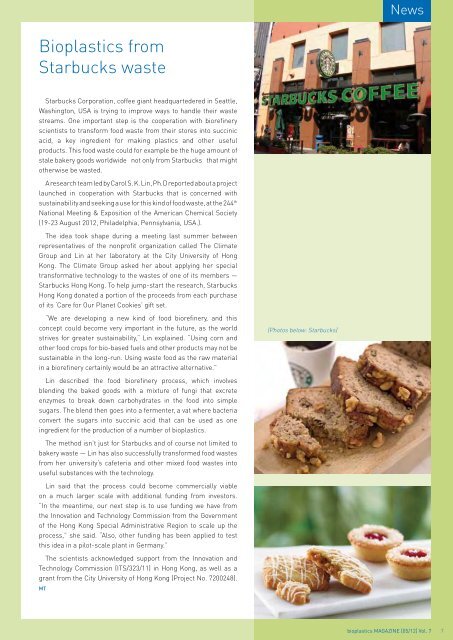bioplasticsMAGAZINE_1205
bioplasticsMAGAZINE_1205
bioplasticsMAGAZINE_1205
You also want an ePaper? Increase the reach of your titles
YUMPU automatically turns print PDFs into web optimized ePapers that Google loves.
News<br />
Bioplastics from<br />
Starbucks waste<br />
Starbucks Corporation, coffee giant headquartedered in Seattle,<br />
Washington, USA is trying to improve ways to handle their waste<br />
streams. One important step is the cooperation with biorefinery<br />
scientists to transform food waste from their stores into succinic<br />
acid, a key ingredient for making plastics and other useful<br />
products. This food waste could for example be the huge amount of<br />
stale bakery goods worldwide not only from Starbucks that might<br />
otherwise be wasted.<br />
A research team led by Carol S. K. Lin, Ph.D reported about a project<br />
launched in cooperation with Starbucks that is concerned with<br />
sustainability and seeking a use for this kind of food waste, at the 244 th<br />
National Meeting & Exposition of the American Chemical Society<br />
(19-23 August 2012, Philadelphia, Pennsylvania, USA.).<br />
The idea took shape during a meeting last summer between<br />
representatives of the nonprofit organization called The Climate<br />
Group and Lin at her laboratory at the City University of Hong<br />
Kong. The Climate Group asked her about applying her special<br />
transformative technology to the wastes of one of its members —<br />
Starbucks Hong Kong. To help jump-start the research, Starbucks<br />
Hong Kong donated a portion of the proceeds from each purchase<br />
of its ‘Care for Our Planet Cookies’ gift set.<br />
“We are developing a new kind of food biorefinery, and this<br />
concept could become very important in the future, as the world<br />
strives for greater sustainability,” Lin explained. “Using corn and<br />
other food crops for bio-based fuels and other products may not be<br />
sustainable in the long-run. Using waste food as the raw material<br />
in a biorefinery certainly would be an attractive alternative.”<br />
(Photos below: Starbucks)<br />
Lin described the food biorefinery process, which involves<br />
blending the baked goods with a mixture of fungi that excrete<br />
enzymes to break down carbohydrates in the food into simple<br />
sugars. The blend then goes into a fermenter, a vat where bacteria<br />
convert the sugars into succinic acid that can be used as one<br />
ingredient for the production of a number of bioplastics.<br />
The method isn’t just for Starbucks and of course not limited to<br />
bakery waste — Lin has also successfully transformed food wastes<br />
from her university’s cafeteria and other mixed food wastes into<br />
useful substances with the technology.<br />
Lin said that the process could become commercially viable<br />
on a much larger scale with additional funding from investors.<br />
“In the meantime, our next step is to use funding we have from<br />
the Innovation and Technology Commission from the Government<br />
of the Hong Kong Special Administrative Region to scale up the<br />
process,” she said. “Also, other funding has been applied to test<br />
this idea in a pilot-scale plant in Germany.”<br />
The scientists acknowledged support from the Innovation and<br />
Technology Commission (ITS/323/11) in Hong Kong, as well as a<br />
grant from the City University of Hong Kong (Project No. 7200248).<br />
MT<br />
bioplastics MAGAZINE [05/12] Vol. 7 7


















